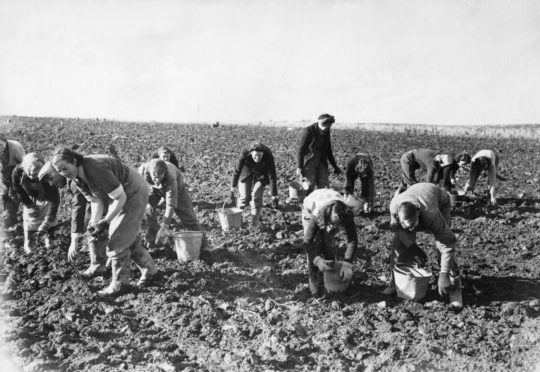Sir, – The present generation may regard me as a dinosaur, but it was with a mixture of sadness and incredulity that I read of High Life Highland’s programme of helping pupils maintain their mental health during the holidays with packs of goodies and useful resources.
It made me realise how lucky my classmates and I were in growing up and going to school in rural Aberdeenshire during the 1950s. The holidays about to begin were in our day the tattie holidays and as the name implies from the age of 12 we spent the fortnight picking potatoes.
At the farm we were each presented with a wire basket and given an area of drill to pick the crop. Boys being boys always thought the girls got a smaller area to pick,while boys who the farmer considered to be cheeky little so and so’s (sadly me included) were allocated areas with the most stones (stones are bad for fingers).
Lunch was provided by the farmer and at one memorable establishment lunch every day consisted of broth, mince and tatties followed by custard, all served in the same soup plate and eaten with the same spoon.
If you didn’t finish your broth you went hungry for the rest of the day. For our daily labours we were given a crisp 10 shilling note – 50p in today’s currency. We felt overwhelmed by our riches.
Life for today’s youngsters is very different and I feel so sorry for those whose lives are blighted by mental health issues resulting from the pandemic and problems real or imagined portrayed on social media outlets.
My generation grew up in a simpler age when mental health was rarely mentioned and activities such as the tattie holidays brought much excitement and some apprehension.
I doubt however if today’s equivalent generation would view such activities with much enthusiasm, even if they were made available.
Ivan W. Reid, Kirkburn, Laurencekirk.
Dons partnership failing to deliver
Sir, – As a loyal and longstanding Aberdeen FC season ticket holder, it gives me no pleasure to say that the Cormack/Glass “experiment” at Pittodrie is dead in the water.
This is what comes from mixing friendship with business.
Are we really to believe that there were no other decent candidates available for the vacant manager’s post earlier this year, nobody with hardened experience?
I bear no ill will towards Stephen Glass; he is simply out of his depth.
Dr Ian A Gillanders, Queens Road, Aberdeen.
Pharmacists are able to prescribe
Sir, – In your article “Pharmacists to be given right to prescribe so GPs have more time with patients”, you report pharmacists will be given the right to write prescriptions under plans being considered by Health Secretary Sajid Javid.
These of course, are plans for the NHS in England, but what Mr Javid fails to recognise is that pharmacists across Great Britain are already able to prescribe for their patients, and regularly do. The regulations to enable pharmacist prescribing came into effect in 2006.
In Scotland, for example, the Pharmacy First Plus service, available through community pharmacies, enables pharmacists to advise and prescribe medication for common conditions.
You also mention that in 2020, the Royal Pharmaceutical Society “called for pharmacists to be given powers to change prescriptions that would reduce delays”.
This is very true, but it is important to clarify that this call was only made in England and Wales, because in Scotland measures are already in place to support pharmacists to make simple changes to prescriptions where there are shortages in supply.
Pharmacists in hospitals, community pharmacies and GP practices across Scotland are working with patients to ensure they get the medicines they need, when they need them.
Clare Morrison, Royal Pharmaceutical Society Scotland, Edinburgh.
